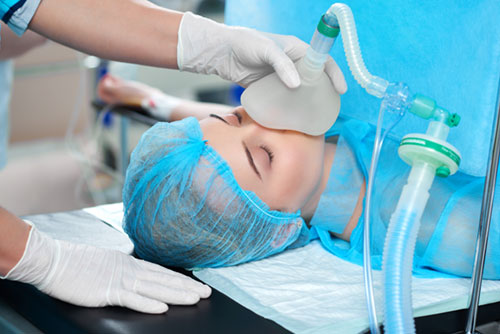In this article, I would like to convey a message about why your anesthetist is more worried about your blood pressure (BP).
Importance of Blood Pressure in Anaesthesia
Hypertension is the term for people who suffer from high blood pressure. Blood pressure is the pressure exerted by the flowing blood on the inner walls of blood vessels. The pressure is the result of the pumping action of the heart which drives the blood through the circulatory system. Blood pressure is the pressure in the bigger arteries. Hence, we measure BP in the arm which gives us the brachial artery pressure.

Blood pressure is one of the key measures which tells us how our body is functioning. It is measured with two values – systolic and diastolic. When we measure BP manually, we place the BP cuff around the arm and place the stethoscope in front of the elbow. When we inflate the cuff and start releasing it, the point when you hear the heart beat start is the systolic pressure and the point where the heart beat disappears is the diastolic pressure. Blood pressure has a range and it varies from person to person depending upon age and weight and it need not be the same range always. The acceptable normal range is from 90/60 mm of hg to less than 130/90 mm of hg. The systolic range is 90-130 mm of hg on average; above 100 for systolic is a good number. Diastolic range is 60-90 mm of hg. For systolic 140 and diastolic above 90 we suspect underlying hypertension. At times we can see high blood pressure during anxiety, pain, migraine, medications such as contraceptive pills, anti-depressants, etc.
When the patient is coming for surgery, blood pressure falls into one of the most important concerns, as all types of anaesthesia agents cause hypotension. Spinal and epidural anaesthesia lower the blood pressure. Most of the intravenous sedation drugs, additive drugs to prolong the duration of regional (spinal, epidural, nerve block) anaesthesia also reduce blood pressure.
Who is more prone to hypotension with anaesthesia?
Patients prone to hypotension include the following – those with low baseline BP of 100/60, cardiac patients with less pumping function, elderly patients, malnourished, low haemoglobin levels, dehydration, and patient with severe infection termed as shock and surgery which causes more blood loss.
Why are we concerned about it?
Low BP causes decreased blood flow to all major organs like the heart, kidneys and liver. This will lead to low perfusion and as a result it causes acute kidney injury i.e., decreased urine output and rise in renal enzymes (urea, creatinine), stroke and heart failure.
On the other hand, anaesthesia procedural techniques can cause hypertension. The response to such stimuli is the introduction of laryngoscopy to secure the airway for general anaesthesia and when we bring the patient out of general anaesthesia for extubation, the BP shoots up. When a patient is a known case of hypertension. Their blood pressure is fragile and the rise or fall will be extremes. At the same, if there is a fall in blood pressure either they respond sensitively or have no reaction for to the medications to bring their blood pressure up.
Anxiety is one of the major causes of high BP; that’s why we have the term white coat hypertension in which the patient’s BP is recorded high only in stressful hospital circumstances. Persistent high blood pressure during the surgery can increase your risk of serious and potentially life-threatening health conditions, such as on-table myocardial ischemia (heart attacks), heart failure signs such as pulmonary oedema (congestion of fluid in the lungs), stroke, muscle weakness and nerve impairment.
If the surgery is an elective procedure, we need to optimize the BP and then plan for surgery. Many times, patients get diagnosed with hypertension only when they get evaluated for a surgical procedure. In that case, we need at least a couple of weeks to bring down the BP. This applies if the procedure is an elective surgery. In a known case of hypertension, if the patient’s BP is persistently high, then he/she will require added dosage or a change in the type of anti-hypertension medications. Hypertension patients are the most challenging ones to handle during the surgery as fluctuations in the blood pressure is seen drastically. Any patient We need to know their baseline vital signs and blood pressure to be maintained for organ perfusion.
High BP risk factors include a family history of BP, age over 65, chronic diabetes, pregnancy, being overweight, consuming a lot of salt, sedentary lifestyle, increased intake of alcohol and coffee, smoking and sleep deprivation. Hypertension is preventable and can be controlled with lifestyle modifications. There are certain pathological conditions which cause hypertension. These include diabetes, kidney disease, chronic kidney conditions, obstructive sleep apnea, glomerulonephritis, hormonal fluctuations, Cushing’s syndrome, acromegaly, Lupus and scleroderma.
If you seem to have normal blood pressure, or know which medications to continue or stop before a procedure. Kindly consult a physician for guidance .We need to check blood pressure at three different times to get your mean average blood pressure to diagnose hypertension. Other investigations of ECG, Echo, can reveal hypertension.
To conclude, always know your baseline blood pressure range. During your hospital stay, you will be checked for blood pressure multiple times. If a doctor suspects that you have underlying hypertension, do get yourself worked up for it. Never ignore. Hypertension starts at an earlier age when it is not treated, uncontrolled hypertension leads to disastrous clinical consequences such as stroke, Brain bleed, and cardiovascular events. Hence, if there is time for optimising your blood pressure, do take the physician’s opinion and follow practices to keep your blood pressure under control. Blood pressure within the normal range will give a smooth travel for your anesthetic surgical treatment journey.

Dr. K. Mahalakshmi
Consultant Anaesthesiologist
Kauvery Hospital Chennai
